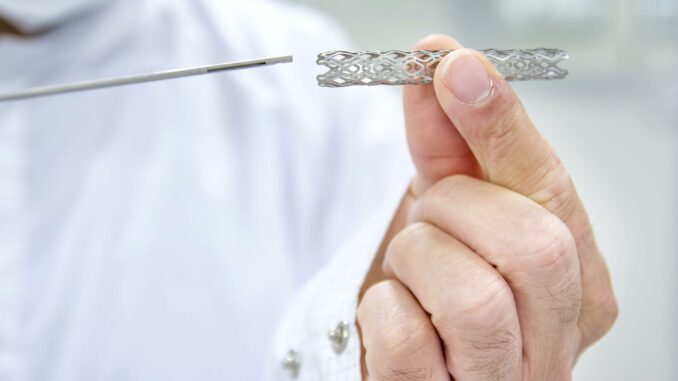
Here’s what the research is showing us
Unsubscribe | Report as spam | Change email preferences
Are stents a good idea?

Narrowing blood vessels are a problem for many people.
This slows the flow of blood and nutrients in the body as well as increasing the risk of major cardiovascular events.
One treatment for this involves surgery to insert a short wire mesh tube called a stent into the blood vessel to hold it open.
This is also known as percutaneous coronary intervention (PCI).
This stent procedure has been used for a few decades…
…but research shows that it’s no more beneficial than medications.
In fact, some outcomes are a little worse for people who have had stents versus those who just use medications and lifestyle changes.

The human research was carried out at Buffalo General Hospital in New York. The paper was published in The New England Journal of Medicine.
The first coronary stent was implanted in 1986.
It was decades later when these researchers decided to see whether this procedure was superior to nonsurgical alternatives.
They carried out their analysis in people with stable heart disease.
“It is unclear whether an initial management of percutaneous coronary intervention with intensive medication therapy and lifestyle intervention is superior to optimal medical therapy alone in reducing the risk of cardiovascular events.”
The researchers recruited over 2,000 people with confirmed heart disease and coronary artery disease for the study.
“We conducted a randomized trial involving 2287 patients who had objective evidence of myocardial ischemia and significant coronary artery disease.”
About half of the participants were assigned to undergo PCI – the surgical implantation of a stent.
The remainder stayed on medications and followed lifestyle guidance.
“Between 1999 and 2004, we assigned 1149 patients to undergo PCI with optimal medical therapy and 1138 to receive optimal medical therapy alone.”
The researchers followed up with the participants for an average of 4.5 years.
The difference in cardiovascular events between the two groups at the end of that time period was insignificant.
The implantation of a stent didn’t reduce cardiovascular events.
“There were 211 primary events in the PCI group and 202 events in the medical-therapy group.”
In another analysis it seemed that those undergoing the procedure had a 5% increased risk of cardiovascular events.
“The 4.6-year cumulative primary-event rates were 19.0% in the PCI group and 18.5% in the medical-therapy group (hazard ratio for the PCI group, 1.05).”
Between group differences for death, heart attack, stroke and hospitalization were insignificant.
Again it seemed that the stent didn’t improve things.
“There were no significant differences in the composite of death, myocardial infarction, and stroke (20.0% vs. 19.5%); or hospitalization for acute coronary syndrome (12.4% vs. 11.8%).”
The research didn’t prove that stents should never be used…
…but it does show that they should not be the standard of treatment for everyone with narrowed coronary arteries.
“As an initial management strategy in patients with stable coronary artery disease, PCI did not reduce the risk of death, myocardial infarction, or other major cardiovascular events when added to optimal medical therapy.”
It’s a pattern I see over and over again regarding surgical procedures.
Many great advances in technology have been made in recent decades…
…and a vast number of technological surgeries have been carried out under the assumption that they would be beneficial…
However… many of these surgeries have proven to be useless…
And many more have caused more harm than good.
And with surgery, there is always the risk of an accident…
And there is the added stress of recovery from the procedure as well as the financial cost.
You should always consult your healthcare practitioner for guidance on medical diagnosis and treatment.
—-Important Message—-
Penile implant? Give her a powerfully large member filled to the brim with hugeness

Every one of the 400,000+ guys who subscribe to my newsletter knows that the secret to long lived happiness as a man is good penile blood flow.
You know it and I know it: when lots of oxygen-rich blood flows into the penile chambers of a man’s member, they expand and get more engorged…
And this makes erections stronger, bigger, and longer-lasting. All from blood flow!
So if your blood flow down there isn’t what you would like…
…if things have gotten a little saggy and soft down there…
…or if you just want a natural alternative to what you’ve been using…
Try my Vasodilation Protocol — it’s one of the most amazing things I’ve ever done…
———-

